Jon Ralph chats to Collingwood’s All Australian ruck Sharni Norder about her journey from Australian Diamonds captain to AFLW battler to accomplished footballer. Norder (nee Layton) has just published her first book — No Apologies — which charts her rise to netball stardom and her journey back from rock bottom.
JR: Great to chat Sharni. It’s your day off but you just don’t stop. What’s a normal day look like?
SN: I am the head of netball at Methodist Ladies College in Kew so I am doing 30 hours there a week at the moment in between everything else. So at the moment I am up at 5am, out the door at 5.30am. My role is overseeing 29 teams, 306 kids, so I am overseeing training from 7-8am, then do my office work and admin about midday, head to training about 4pm, finish training about 9pm and then get home at about 10pm. I do my weights in my own time and the game on the weekend. So those days of having time to myself are long gone. I am bloody devastated …. (laughing).
JR: Does it help your football to have a balance or are you just stuffed from the workload?
SN: It is exhausting. I respect the AFLW girls so much, knowing a lot of them if not all of them are working or studying full time. When I was in netball I had to be full time to be as good as I was. To have time to prepare meals, do recovery properly, lift weights properly. I am not getting as much out of myself. So it’s a fine line to have that balance and have something outside of footy.
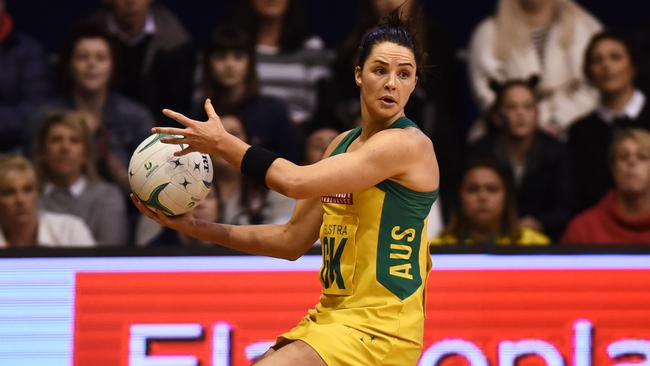
Watch every match of the 2021 NAB AFLW Competition LIVE on Kayo. New to Kayo? Try 14-Days Free Now >>
JR: Ever resent the men’s players doing a nice half day and then cruising out of the club at 2pm?
SN: Oh, without a doubt … I started my career in 2008 and I was playing for the Melbourne Vixens training at Collingwood and I used to think it now and I still think it then. But I count myself as really fortunate. I had some really good years with good sponsors where I was getting paid well from netball so I was able to be a full-time athlete for five or six years.
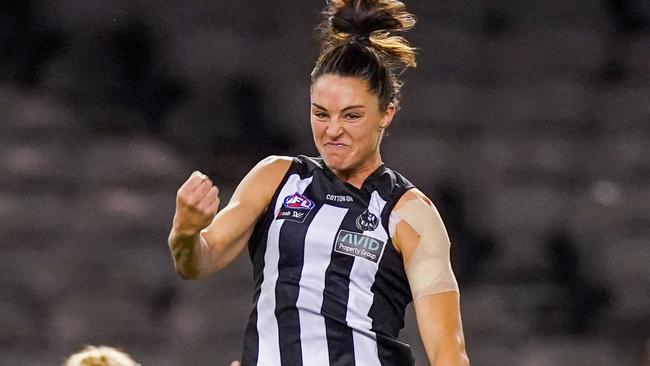
JR: What did you make as a netballer?
SN: Um, with the sponsors I was on triple figures. Double figures without the sponsors.
JR: How many Australian female athletes are actually making enough money from sport to thrive rather than survive?
SN: I wouldn’t say many. I wouldn’t know anyone in our team who would be able to do that. It’s a complete assumption, but Tayla Harris would have good sponsors. When you are talking about living off your wage, we are talking about maybe $40,000, not hundreds of thousands. Maybe there might be three of four surfers, the Australian Diamonds would be full-time. The Australian cricketers. So less than 50, that’s my assumption. And these women have to balance so much. Especially in Olympic sports, it isn’t as well-sponsored as it was. So many women are having to work full-time and play sport and they are sacrificing so much to make our country proud.
PART ONE: THE SURFING WORLD CHAMP WHO WON’T BE SILENCED
PART TWO: WHY WOMEN’S SPORT HAS NEVER BEEN BETTER
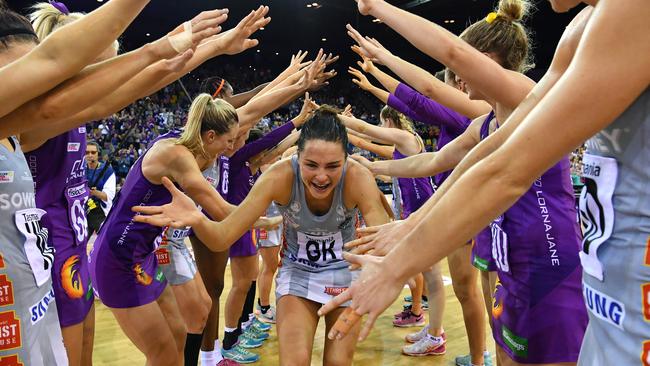
JR: How good would the AFLW be if women were full-time professionals?
SN: Oh my god, you could fast-track 10 years of progress into three or four years, easy. When I transferred from netball to football I was still full-time. Everyone was like, “Sharni, how did you get better so quickly?” I wasn’t working through the day so I could do an extra two to three skills sessions on top of three during the week, I was lifting weights three or four times, so I was probably training 10 times a week to get to that standard.
JR: So when more women can do that, how good will the AFLW be by, say 2030?
SN: Off its head good. I am so excited. Think about how far it’s come and in the improvement in skills and game awareness this year with a full year off. The VFLW and AFLW seasons are aligned now so once the season is over we have a couple of games to go and then we have six or seven months without footy. So to improve the standard even more we need to close the gap. Last year Collingwood came off a VFLW season where we won the premiership and then came into the AFLW hot and firing. So once we get that consistency of training and playing all year round plus the competition will be at an elite standard. We don’t even have time at training to focus on skills. We can only fit in all-team drills. Once we get the extra skills sessions the boys have, the extra weights and pilates to bounce back better, think about how fit we will be.
JR: I like the AFLW. I love taking my kids to it. But on the weekend a Dogs player had a set shot from 40m that fell short by 20m. I get the feeling some people want to write the competition off because of its worst moments, not its best ….
SN: I think so. I think haters are always going to find something wrong with it. We are challenging the status quo. We are making people feel uncomfortable because they have never watched women’s footy.
JR: What would you say to that person?
SN: Those people won’t come on board so there is no point in wasting time on them. How many people have seen how far we have come? The boys kick it 50m but they are in the gym every day of the week. We are fitting in the gym around work and uni. As the strength programs allow us to lift more, we will kick it further.
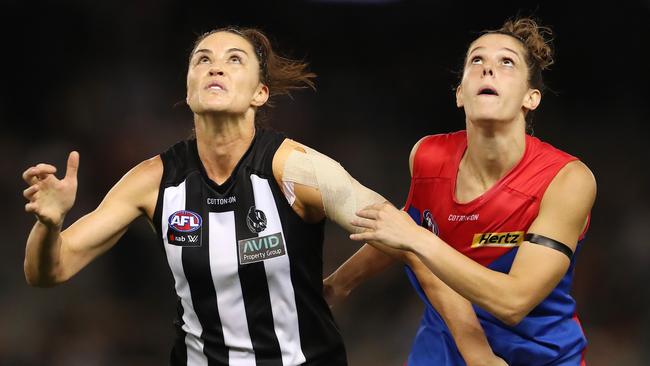
JR: How the hell did you go from a self-confessed battler in your first season to the All Australian ruck?
SN: I can learn and apply knowledge very quickly. You have to remember I am in a high-performance environment with Brodie Grundy as my one-on-one coach. We have a very similar energy. We play by feel, we play off energy. He speaks my language. People who are very analytical I don’t connect with. Ruck coaches were telling me stuff and I was like, I don’t like the sound of it, I don’t like the feel of it. He was like, “Let’s do this, I will show you how to do it”, and I was like, “That’s awesome, I can apply that”. So one week I would work on my jump, the next on my taps, and then I could concentrate on something else. The first year I had no idea and to be fair this year I have struggled a little as well. Taking a year off did disrupt the flow I was in and I don’t have time that I did last year to put into footy.
JR: What would you say to Gillon McLachlan if he asked you about how to make this competition even better?
SN: Just the games. We need more games. If you look at the men in 2020 coming off COVID, when the season started they were playing shorter games and they were kicking less goals with more congestion, which is what everyone judges the AFLW for. It took them seven or eight rounds to play good footy. We are heading into the finals in our season by the time the guys start to hit their straps. You don’t even get to see the best of us. It’s already over by the time we are peaking. So it’s about the longevity of the season. That’s what we are pushing for. How can we make our season longer? We should be able to play each other at least twice.
JR: Did the AFL try hard enough to finish the AFLW season last year, because in hindsight it doesn’t look like it?
SN: It’s a very difficult question. I think at the time to be honest we didn’t think anything else of it. But then if you flip it, if it was the men’s competition would they have found a way? I think that’s a fair enough question to ask. We didn’t judge it because it was our first time in a pandemic so it was played out in the best scenario at the time, but if the shoe was on the other foot with the men’s competition, what would they have done?
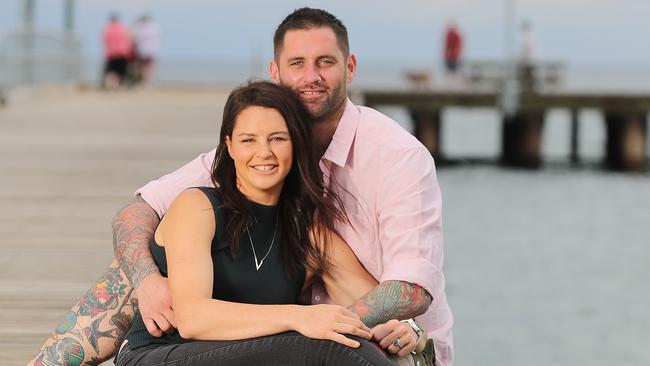
JR: You spent six months away from netball working through a pretty significant mental health battle in 2018. You had been the international player of the year in 2016-17. It ultimately saw you leave the game and find AFLW. How did you get into it and how did you get out of it?
SN: For myself, I pushed myself too hard for too long. I am a perfectionist, which is a very dangerous trait to have when you suffer from anxiety or depression. I was striving to achieve great things in sport, which I did. But I missed the point of what life was all about — community and friendships and family. I had great friends in teams but I moved around so much. From Melbourne to Canberra to Adelaide to Sydney and back to Melbourne. You have good friendships for two or three years and move on and lose touch. You don’t have grounding. I was interstate and I was lost and I was lonely. I was playing for Australia and achieving everything with all that sacrifice and I didn’t know why I was feeling nothing.
And it was because I was striving for the wrong goals. In my personal life I was alone and by the time I realised I moved back to Melbourne but it was too late. By the time I sought help, my depression was really bad. It was when I decided to take time off sport. I was having daily breakdowns, crying and not knowing why. For me play sport I had to be mentally healthy after six months of struggling to get out of bed. By the time I got back into that state I realised netball wasn’t ticking any of the boxes in my life in regards to connection. I would rock up to training and the footy girls were always there, having a laugh. Footy ticks the boxes about personal values, the mindset of playing for a team, working hard but not worrying about the outcome.”
JR: Since you shared your story I can imagine there must have been an avalanche of people sharing identical stories with you.
SN: So many, Ralphy, so many. That’s why I was so open about it. I went to a psychiatrist and he told me the symptoms of depression and helped me. But it’s really hard getting healthy. What I would say to anyone out there struggling is keep trying. It took me months of riding my horse, being outside, seeing my family and not having joy. And then one day the joy started coming back. Those things eventually will make you happy. So don’t judge yourself. The symptoms of depression are feeling really flat, when your mind freezes in conversation and you have anxiety socially, when you are really lethargic and not motivated. If those kind of symptoms resonate, then seek help.
JR: What did it feel like when the things you live all of a sudden started making you happy again?
SN: It was just the best. It really shifted my perspective on life. As that happiness started coming back, and I was guided by professionals, I remember thinking I love feeling this way. I never want to let anything change this feeling again. So in the end I thought, this is what makes me happy. I am really quite stubborn on what I will and won’t do to make sure I keep feeling this way.
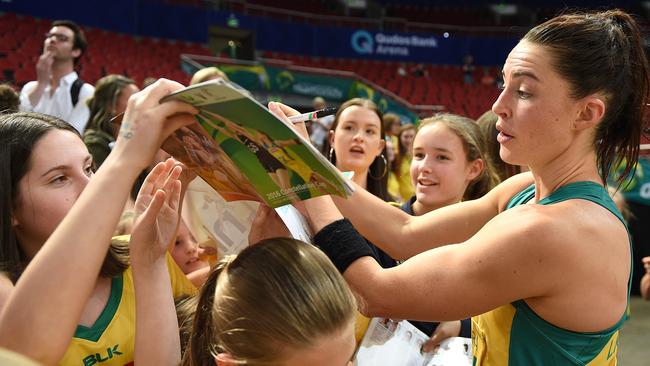
JR: You were coached by Lisa Alexander at the Diamonds, who applied for the North Melbourne senior role. She was knocked back from even the chance to interview. Could a woman be a senior AFL coach?
SN: Absolutely. But I think if you want to be an AFL senior coach you need a background in the AFL. That’s my own opinion. If you are chatting about Lisa, she is great at delegating, great at high performance. She would be a great high performance manager.
But I think in any code, you can’t go from football to netball or netball to football. The longer women coach football the better they will be. There are a few now that would already be great in a men’s program and I hope clubs continue to be open to that. It shouldn’t matter about gender, it should be how you manage a team and how professional you are.”
JR: Where would an AFLW premiership slot in with Australian Diamonds captaincy, the 2014 Glasgow Commonwealth Games gold, two World Championships?
“I think right up there in the top among them all. For me a part of the reason of wanting to play in the AFLW was to be part of the movement. It’s so awesome. I just imagine being able to tell my kids I was part of the AFLW, pushing a huge women’s sport at a really prolific time.”
JR: You turned 33 in January. How long are you going to play AFLW for?
SN: I don’t know. It will be interesting. I am just going to see year by year because I love footy and I love what it brings to my life. It’s a really tough position because trying to set myself up for life after footy it’s hard to balance both but footy makes me so happy so I don’t want to leave it behind. It’s hard because in the AFLW we have to make a call in April or May about playing the following year but I just love it so much that I will play at some level until I can’t play any more.”
Norder’s book No Apologies is available through Angus and Robertson.

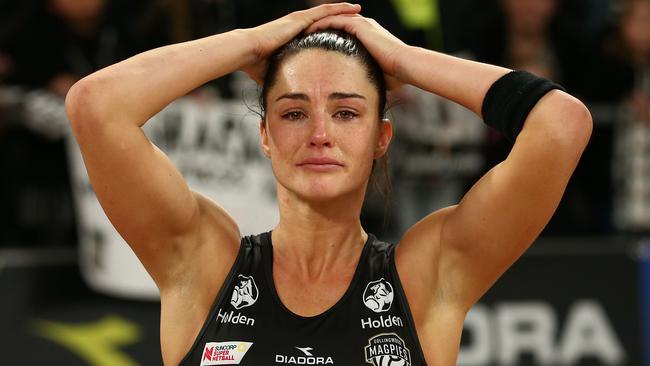
Add your comment to this story
To join the conversation, please log in. Don't have an account? Register
Join the conversation, you are commenting as Logout
Melbourne WNBL team revived, but it’s not how you’d think
After lying dormant — despite one club’s best efforts to revive it — the Melbourne name will fly again in the WNBL, as a former championship star returns.
‘Blew up’: How Opals’ saviour beat the clock to make hoops history
Just when it looked like Australia would cruise to a first-ever Asia Cup gold, a Japan salvo threatened to cruelly rip away history. Here’s how a new Aussie hero beat the clock and rescued the Opals.